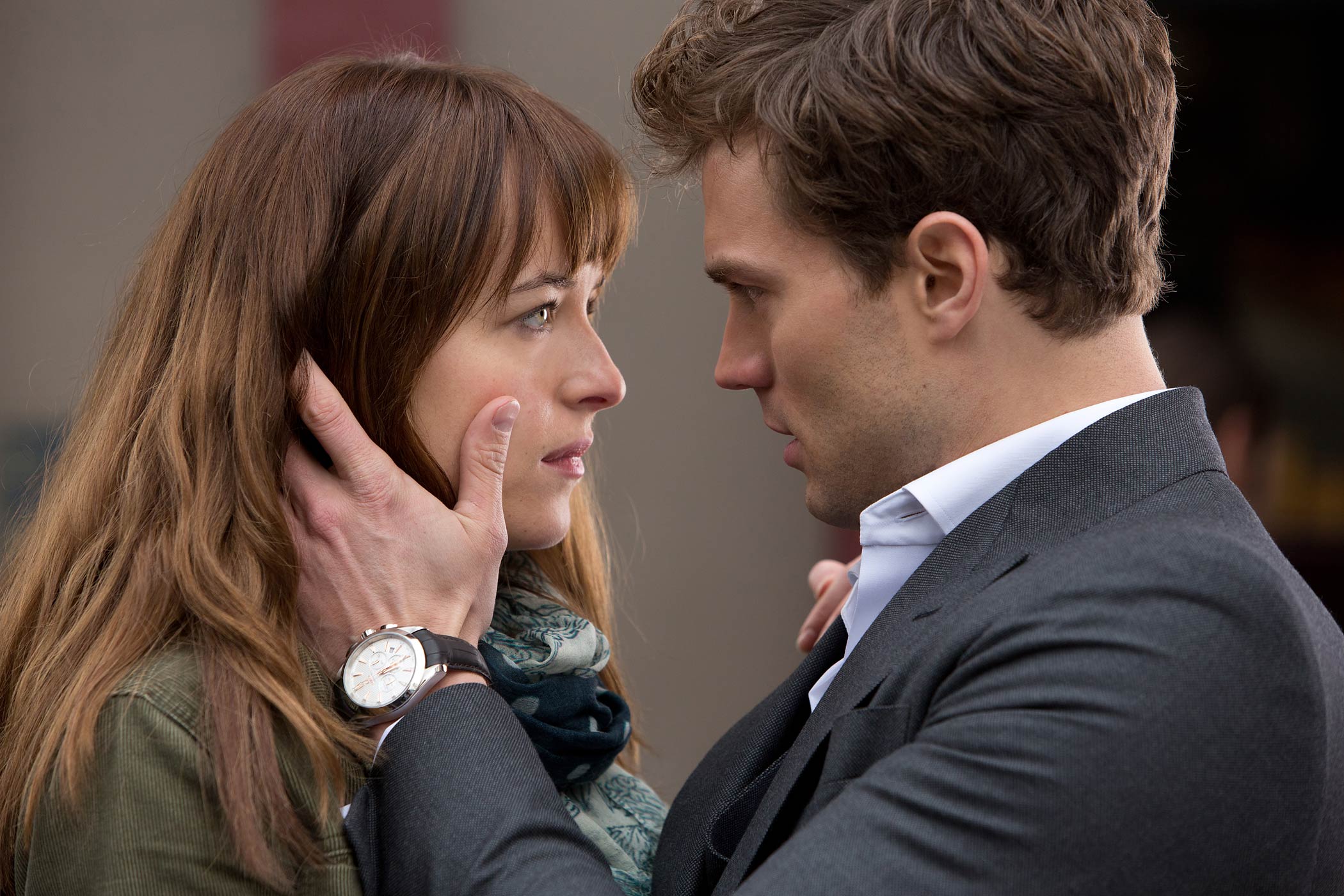

Everyone’s favorite hatewatch has just hit theaters, thereby expanding our Fifty Shades of Grey mocking opportunities from the bestselling series to a set of blockbuster films. (Because there will be more, friends. Oh, yes, there will be.)
Everyone’s got a theory on why Fifty Shades is so popular, especially among middle-aged women and in the South, where for some reason people find it hilarious that Fifty Shades has caught on like a house afire. It’s been dismissed as “mommy porn” and the soft (and wildly inaccurate) BDSM has been credited as the main reason the series has become such a terrifyingly runaway success.
But I don’t think that’s actually why the series blew up, and I’m not the only one who has this theory: It’s all about those $$$, baby.
But let’s backtrack a little to Twilight, the inspiration for the fanfic that eventually became Fifty Shades of Grey. Credited with making vampires sexy, Twilight was as much about money as it was about creatures of the night. Edward had a lot of money, something readers were reminded of over and over again. Bella, by contrast, did not. And you can’t deny that part of the sex appeal for her was the fast cars, beautiful house, and access to impeccable fashion — Edward offered not just sexual thrills but also the seduction of financial security.
For people who’ve never been poor, it can be hard to estimate how important that is. For those who have experienced poverty, it’s remarkably easy to see why readers of all ages were enticed by Twilight and what Edward had to offer Bella beyond creepy vampire babies and stalkerish behavior.
E.L. James clearly integrated that into Fifty Shades, making it an integral part of the story. The whole point is that Christian Grey is an incredibly wealthy, powerful man with a secret — Edward to a T. Part of what draws Anastasia Steele to him is that immense wealth and power, not just what he has to offer sexually, which is mostly a series of violating and upsetting scenes that grossly mischaracterize BDSM.
Which brings us back to the original point: Are people reading the books for the sex, or the money? I’d argue that for many people, it’s the money, and it’s not a coincidence that some of the book’s biggest demographics also come from some of the poorest social groups. The South is, overall, much poorer than the rest of the country, and the escapism of a book where an ordinary women is swept up in a journey where wealth and power are put center stage is irresistible.
For women who aren’t necessarily poor but might be living lives where they don’t feel fulfilled, the adventurousness and appeal of Fifty Shades might not be about the sex. It might be about opening the possibility to a world where you can drop anything and fly to a beautiful place in the tropics at a moment’s notice, to a place where your boyfriend will send a helicopter for you, to a place where everything around you drips with wealth — something many of us like to imagine, let’s be real. It’s not just about financial security, but the idea of what we could do with wealth that feels unimaginable to us.
At the Daily Dot, Miles Klee neatly pins down the real reason people love Fifty Shades:
This fetishization of wealth, along with Grey’s whiteness and good looks, also seems to be the only thing that excuses his obsessive, stalkerish behavior throughout . . . Just ask yourself a simple question: Would a story about a poor but psychologically controlling farmer who likes tying up girlfriends and whipping them in a barn have had the impact on our nation’s consciousness that Fifty Shades has?
Meghan Daum at the Los Angeles Times shares this opinion, writing that “for all the libidinous hype, the book is ultimately less about sex and power than about money and power. For every reference to handcuffs and inner goddesses, there are even more nods to Christian’s incalculable wealth.”
BDSM-themed romance novels and literary fiction are a dime a dozen. Lots of them are much better written than Fifty Shades, with much more coherent plots and complex, nuanced writing (hey, I’m not talking badly about James — she herself admits that she’s “not a great author“). So it’s not about the appeal of BDSM; kinky people are kinky people, their tastes are not “singular,” no matter what Christian Grey seems to think, and there’s a definite audience for BDSM-themed fiction.
Millionaire romance, on the other hand, has a huge readership, and it’s definitely not new, with some of the earliest Western novels being all about women marrying into money. Some variation upon “ordinary girl marries wealthy man” has been told over and over again in pretty much every permutation possible, and this is just one iteration. It’s not at all surprising, in that context, that Fifty Shades appeals to such a wide audience, many of whom like it in spite of the BDSM, not because of it.
As for why Fifty Shades in particular went big instead of any number of other “poor girl marries rich guy” narratives, well, that one’s a little more up in the air. It’s entirely possible that some readers do indeed like the slightly naughty element of the BDSM, given the fact that soft BDSM has long been labeled as a bit “spicy” and recommended for people who want to switch things up, as it were, in the bedroom. Or maybe James came along at the perfect moment to ride that Twilight wave.
But make no mistake: People aren’t fetishizing these books because of the fetishes. They’re into them for the straight up Benjamins, and I can’t blame them.
After all, I’d like to claim that I wouldn’t have a torrid affair with a member of the 1 percent for the money, but I totally would.
S.E. Smith wrote this article for xoJane.
Read next: My Grandma and Mom Saw Fifty Shades, And Here’s Their Review
Fifty Shades of Grey: TIME's Exclusive Portraits of the Cast and Director



More Must-Reads from TIME
- Donald Trump Is TIME's 2024 Person of the Year
- Why We Chose Trump as Person of the Year
- Is Intermittent Fasting Good or Bad for You?
- The 100 Must-Read Books of 2024
- The 20 Best Christmas TV Episodes
- Column: If Optimism Feels Ridiculous Now, Try Hope
- The Future of Climate Action Is Trade Policy
- Merle Bombardieri Is Helping People Make the Baby Decision
Contact us at letters@time.com